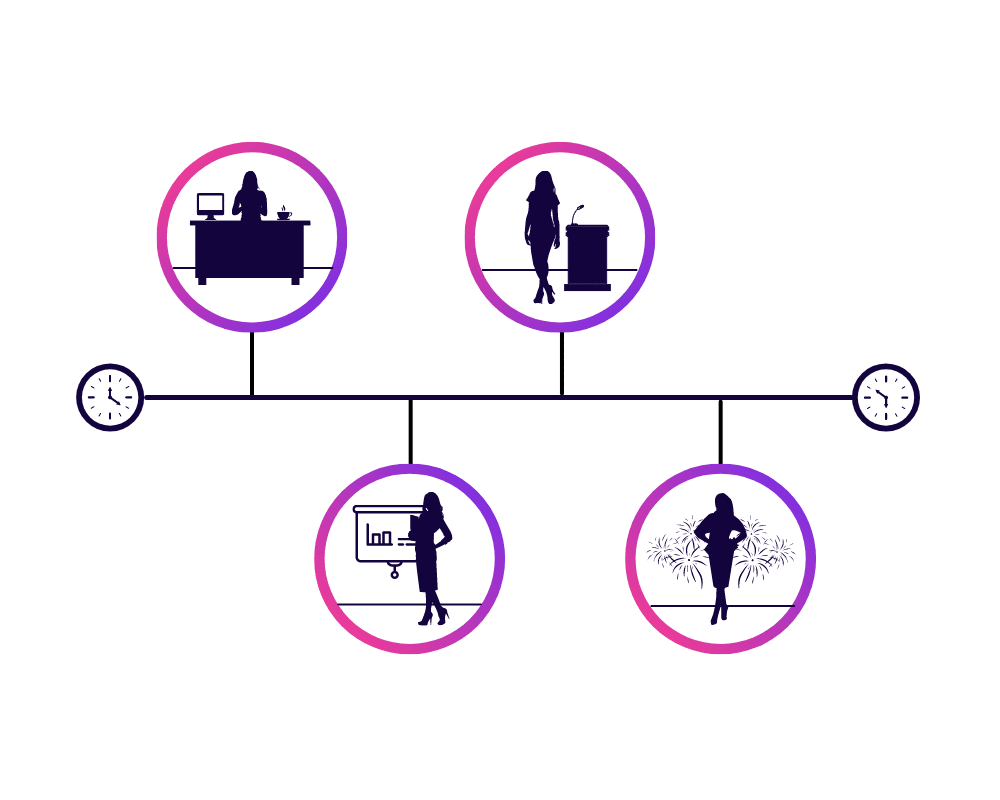When starting a speaking business, it goes without saying that the more prepared you are, the better. If you have a well-designed website, for example, you appear professional and experienced, even if you’re brand new to the speaking industry. In the same way, as you prepare the components of your business – or update the materials you have currently – the more time, energy, and thought you put into them, the more they’ll pay off in the long run. For many speakers, this challenge leaves them asking, “What do I need to include on a website?” or “What does a good personal brand look like?” Here, we’ll focus on another common question, “What should be in a speaker bio?”
In short, a speaker bio is a snapshot of your professional and personal experience. Ideally, it should include your work history as well as any related personal experiences, awards, or published work. It should also include a few “fun facts” about you. After all, that’s what a speaker bio is for – explaining what makes you you!
To ensure your speaker bio ticks all of these checkboxes, we’ve explained each of them in more detail in this guide. Below, you’ll find explanations, examples, and additional tips and tricks to help you write a bio that paints you in the best light.
Summary of Your Work History
When answering, “What should be in a speaker bio?” the first thing to include is your work history. Like any form of thought leadership – including coaching, consulting, or authorship – professional speaking is first and foremost about being an expert. This means that, although you may be marketing yourself as a speaker, underneath that layer, the deeper question is, “In which industry(ies) or situations are you an expert?”

For example, looking at speaker and author Mark Hunter’s bio, it’s almost immediately apparent that he’s a sales expert. For one thing, it mentions that “For over 20 years, Mark has been helping companies identify better prospects, close more sales and profitably build more long-term customer relationships.” It also then goes on to say, “Prior to becoming a sought after sales speaker, Mark spent 15+ years driving success in three Fortune 200 companies in both sales and marketing roles. Mark’s extensive corporate experience allows him to connect at a higher level with corporate leaders and teams.” In this way, Mark shares his experiences both before and after his segue into professional speaking.
Likewise, your own speaker bio should highlight both aspects of your professional history. You can write chronologically or in reverse chronological order, as Mark does. However you choose to share your history, the key is to be concise and emphasize your exceptional depth of knowledge and experience in your niche.
Remember: You are an expert first and a speaker second. If you establish your authority in your primary area of focus first, presenting yourself as an authority figure in the speaking space will come much more easily.
Summary of Your Related Personal Experiences
Similarly to work history, the next answer to “What should be in a speaker bio?” is your relevant personal history. For many speakers, professional experience is only the starting point for their speaking focus. The more important – and more powerful – driving forces behind their thought leadership come from their personal experiences over the years.

For example, Australian-American speaker, author, and entrepreneur Nick Vujicic has amassed an incredible resume of professional experiences. Born without limbs, Nick’s efforts include partnerships with various governmental education programs and his creation of the Social Emotional Learning (SEL) Curriculum “Attitude Is Altitude.” Both of these accomplishments empower participants to enact positive changes in their lives and indicate Nick’s dedication to his cause.
However, Nick credits his greatest source of motivation to his personal experiences throughout life. In the words of his speaker bio:
Nick faced tremendous obstacles in life from, living life without limbs, to being bullied at school and fearful for his future with no purpose in sight… Nick persevered through life’s challenges and discovered key principles which enabled him to find his purpose and turn obstacles into opportunities… Millions of people have found hope, purpose and the strength to overcome their challenges through Nick’s inspirational speeches and powerful coaching.
Summarily, although Nick’s professional experiences and accomplishments are undoubtedly admirable, what’s even more striking is the depth of his personal experiences. Even having never met him, you get a sense of how powerful his speeches are, considering he lives his message every day.
In the same way, balance your speaker bio with the professional and personal things that led you here. Not only will it add to your speaking credibility. It will also captivate those reading your bio, from potential clients to audience members.
Mention of Your Qualifications and Awards
The third answer to “What should be in a speaker bio?” relates to both the personal and professional aspects of your life. I’m talking about any qualifications, certifications, awards, or educational accomplishments that further establish your credibility.

Outside of the speaking industry, there are an infinite number of things that apply in this category. If your focus is human resources, for example, you may be a Senior SHRM Certified Professional (SHRM-SCP), a Senior Professional in Human Resources (SPHR), or a Professional in Human Resources (PHR). You likely also hold a bachelor’s degree in a human resource management, communication, or business administration. Both of these qualification “genres” – the first of which are supplemental and the latter of which are foundational – are important to include in your speaker bio.
Similarly, internal to the speaking industry, there are basic and advanced certifications that can set you apart from other speakers in your arena. If you’re a member of the National Speakers Association (NSA), for instance, you may be a Certified Speaking Professional (CSP) or a member of the Council of Peers Award for Excellence (CPAE) Hall of Fame. Besides NSA awards, you may also be an eSpeakers Certified Virtual Presenter or an achievement award recipient from Toastmasters.
Ultimately, it’s up to you which awards or accomplishments you want to acknowledge in your speaker bio. Whichever you choose to include, the most important thing to remember is to briefly mention them in your bio before moving on to the next topic. Your goal is to come across as accomplished and confident but not to the point of arrogance.
Titles for Any Relevant Published Work
After mentioning your accolades, the next step to answering “What should be in a speaker bio?” is highlighting your published work. Like outlining your professional experience, sharing the ways in which you’ve contributed to your focus industry is, for many event planners, a sign of your skills.

If you worked as a doctor, for example, having medical experience is undeniably admirable. But, if you’ve contributed to medical publications on top of that experience, you show that you not only mastered the existing research. You also endeavored to build on that research for the benefit of others. For medically-focused events, especially, that level of dedication and prestige makes you a shoe-in.
That said, aside from scientific research, published work includes a wide range of other compositions. Within the speaking industry, a few of the publications most frequently mentioned are:
- Books (ones you wrote yourself or ones to which you contributed)
- Print or online magazine publications
- Contributions to online blogs (a common blog among speakers is Forbes)
- Peer-reviewed articles or scientific papers
- Digital files or eBooks
- Academic coursework or business frameworks
Depending on your focus industry(ies), one or more of these kinds of publications may be considered especially impactful or distinguished. When writing your speaker bio, best practice is to include only the items that are most relevant to your audience. Generally, the only exception to this rule is books, for which mention of up a handful of tiles is acceptable.
Long story short, your speaker bio’s publication section is solely intended to hit the highlights. If you have an extensive list of publications, one solution is dedicating a page of your website to your publications and media contributions. That way, it’s available for people that want to know more, but your bio is still short and sweet.
Some “Fun Facts” About You
Last but not least, the final answer to “What should be in a speaker bio?” – and one that’s too often forgotten – is fun facts about you!

Obviously, the little things that make you unique aren’t things I can outline in this blog. They’re your personality quirks, your craziest past experiences, and the things you enjoy doing when you’re not working. In other words, they’re things that make you a person rather than simply a figure on stage, the things that make you relatable.
With that in mind, below are four examples of fun facts from other speaker bios. In each of these examples, you not only see something that makes them special but also something that makes you think, “Wow, I’d love to learn more about them!” When writing your own bio, regardless of the angle you take for your fun facts, your goal is the same.
1. Neen James
In this example, Neen James focuses her fun facts around her nationality. Taken from her website, this bio says, “Oh, did we mention that Neen is Australian? Why does that matter? Well, it means that she’s a bit mischievous, is pretty witty and a little cheeky. She also considers herself an unofficial champagne taste tester … and a really slow runner.” In this case, the use of humor makes Neen more approachable and a more sought-after hire. After all, who doesn’t love a speaker that makes everyone laugh while they learn, right?
2. Mimi Brown
In example #2, Mimi Brown gives the reader a peek into her life offstage with her fun facts. She states, “When not speaking or training, Mimi can be found creating delicious meals with chef and hubby Mr. Brown and bribing her snobby cat Kitty Brown with treats in exchange for snuggles.” By sharing these details, Mimi – like Neen – makes herself approachable and relatable to her audience. She also demonstrates her empathy through her clear love for her husband and cat.
3. Greg Offner
In this example, Greg Offner uses his fun facts to surprise. His bio explains, “Having worked over 40 jobs before turning 30; attending 4 different schools before age 14; and then surviving 12 major surgeries to repair extensive damage to his voice from a career in music and sales, Greg doesn’t just speak on disruption, he’s lived it.” In this way, Greg leverages the memorability of numbers to leave an impression on the reader. Put simply, those numbers are eye-catching and impressive, making the reader more likely to remember Greg once they look away from his bio.
4. Ozan Varol
The final example comes from Ozan Varol. In his bio, it states “A native of Istanbul, Turkey, Ozan grew up in a family of no English speakers. He learned English as a second language and moved to the United States by himself at 17 to attend Cornell University and major in astrophysics. While there, he served on the operations team for the 2003 Mars Exploration Rovers project that sent two rovers–Spirit and Opportunity–to Mars.” Here, Ozan makes himself memorable through these incredible experiences. Even if a reader hasn’t met him, they already want to, simply to learn more.
Summary
Summarily, the key elements to include in your speaker bio are largely centered around your individuality. What about your past experiences makes you exceptional, for example? Do you have any awards or achievements that make you stand out? What elements of your life – and the actions you’ve taken – make you a remarkable speaker and expert? Answering each of these questions begins with mention of the items above.
Nevertheless, as mentioned at the beginning, preparation is key. Every event and client is unique, so the most noteworthy elements of your career (and life as a whole) may change depending on the client you ask. Hopefully, this guide provides you with a starting point as you craft your “default” speaker bio. From there, tailor your bio and other speaking materials to the event at hand, and you’re sure to succeed every time.
Remember, in crafting everything from your bio to your brand: You’re an expert first and a speaker second, and preparation is key. 💪





